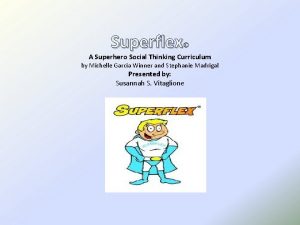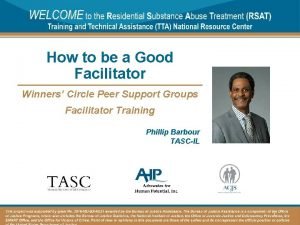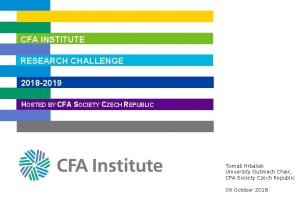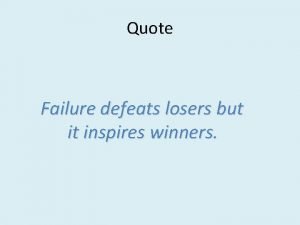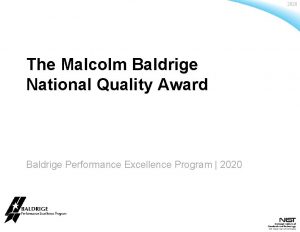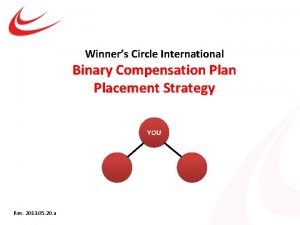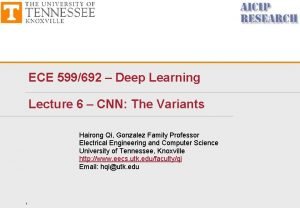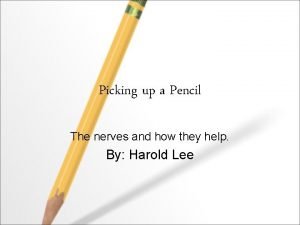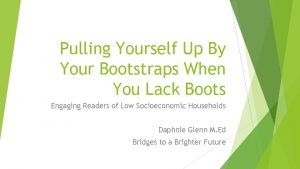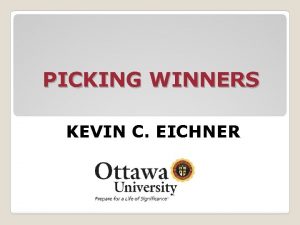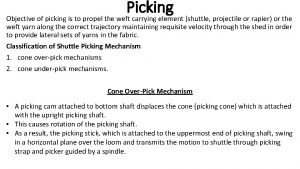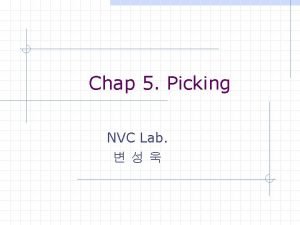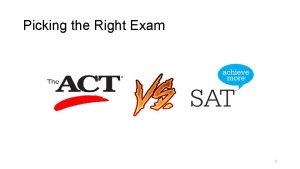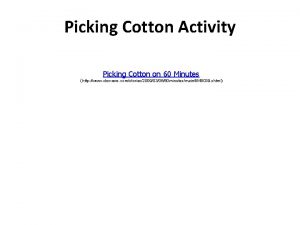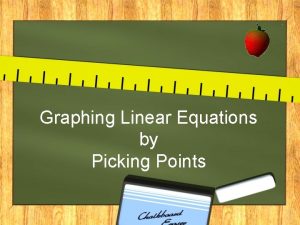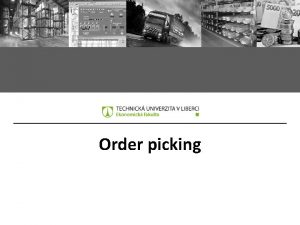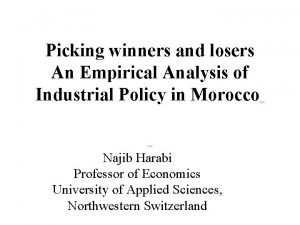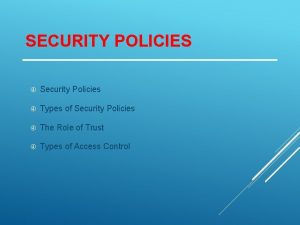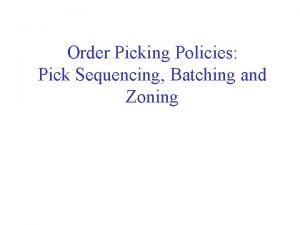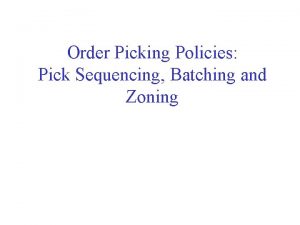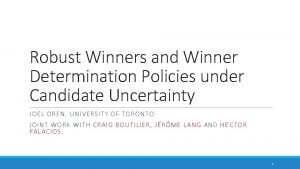Picking Winners When are technologyspecific policies optimal Discussion
























- Slides: 24

Picking Winners: When are technology-specific policies optimal? Discussion by Brant Walker

Overview • Main idea: social planner takes product-level redundancy into account when making her decision • Under equal viability and heterogeneity between technologies • Equal Viability: Social Planner increases social welfare • No knowledge: Social Planner chooses a subset and can increase social welfare • Depends on heterogeneity between technologies • Knowledge: Social Planner chooses a smaller subset and increases social welfare • Social Planner can increase social welfare in winner-take-all

Strengths • Relevant in our current moment • Operation Warp Speed: government officials are “picking winners” for COVID-19 vaccines • Plans to support 8 vaccine candidates • Allows for heterogeneity across technologies and knowledge levels for social planners • Main reason why picking winners is not popular is because social planners do not have private information • The main result is consistent in a variety of scenarios

Questions • Do patent laws have an impact on product-level redundancy? • If a technology is too similar, may not be pursued • Potentially leads to less product-level redundancy • Is there a way to implement costs? • Assuming hiring scientists without labor costs (or costs in general) simplifies scientists’ decision • What market imperfections are assumed to not be present? • Imperfect competition, coordination failures between sectors, knowledge spillovers, information asymmetries, and environmental externalities • If no one has perfect information about technology viability, do we go back to the commonly held beliefs?

Suggestions • Instead of assuming equal viability among technologies, create an innovation possibilities frontier • • R(t) is the R&D expenditure which includes the “wage” for scientists • Possible Extension: May be interesting to understand how many resources are needed based on the amount of heterogeneity among technology viability and information

Schooling and Sustainability: What does Education tell us about Diversion Rates in Minnesota Counties Brant Walker, University of Iowa Jeff De. Simone, University of Iowa

Overview • Question: Is educational attainment related to observable sustainable behaviors, and if so, what levels? • Answer: Yes, bachelor’s degree level educational attainment is strongly linked with observable behavior • Fairly simple differences-in-differences two-way fixed effects • Identify causality as best as our data allows

Motivation MSW generation rates across the United States https: //www. epa. gov/facts-andfigures-about-materials-waste-and-recycling/national-overview-facts-and-figuresmaterials#Landfilling

Motivation • Education has positive effects on income, health outcomes, lower crime, job stability • Modern economics literature tends to agree that education is positively associated with sustainable behavior • Despite vast returns-to-schooling literature, there is a lack of causal evidence of this relationship • Our paper seeks to address this gap in knowledge

Specific Literature Review • Meyer 2015: Took advantage of European minimum schooling law change to find evidence of impact on sustainable behavior • Find increase in secondary-schooling requirements lead to an increase in 7 of the 8 pro-environmental behaviors considered • Chankrajang, Muttarak 2017: Instrumented for educational attainment through teachers per 1, 000 children in Thailand • Find increase in primary and secondary-schooling leads to an increase in some sustainable behaviors that are cost saving, but no increased concern about global warming or willingness to pay an environmental tax

Contribution • Our paper is complementary to the studies above because. . • Framework allows us to examine impacts across the distribution of educational attainment • Use U. S. data, where residents tend to have differing preferences to those studied previously • Study waste diversion, an all-encompassing waste management variable • Incorporates sustainable practices beyond recycling • Based on observed amounts of waste, rather than qualitative recycling behavior from self-reports

Data Strategy • Create new data set combining 5 -year averages of Minnesota SCORE and American Community Survey data from 2005 -2009 and 20102014 • 2 time periods • ACS data only reports schooling levels for geographic areas with populations under 20, 000 as 5 -year averages • Allows key variables such as education and income to change over a longer time frame, and mitigates measurement error in small counties • Main advantage: ability to examine relationship in a panel data framework with two-way fixed effects

Data •

Minnesota SCORE

Data • American Community Survey • Provides controls for other correlates of education • Per-capita income, total population, gender, race/ethnicity, age, employment, unemployment, and share of workers by occupation category and preferred transportation method • Main education measures • Particularly, percentage of residents of each county age 25+ with at least a bachelor’s degree • Other education measures are added in robustness checks

Empirical Strategy •

Main Model

Numerical Estimates • Back of the envelope • 1. 7% average increase in % of adults with bachelor’s degree • Educational effect is about 5. 25% increase in diversion rate

Alternative Models

Addressing Impact of Population

Population Robustness

Threats to Causality • Main limitation: No quasi-experimental mechanism • Put simply, it is possible that individuals who are more likely to attain a bachelor’s degree are also more likely to engage in sustainable behavior due to factors that influence both outcomes • Despite this, we show a significant impact of education on waste diversion practices persists through controls for labor market correlates such as… • Income • Employment, Unemployment • Occupational mix

Conclusion • Have shown 4 -year college graduation is a significant determinant of an area’s sustainable behavior • Could show through elected officials, businesses, and/or household habits • Cannot conclusively claim causality, but analysis identifies causality to the extent the data allows • First paper to utilize waste diversion data as a general measure of sustainable behavior • First paper to provide evidence in fixed effects panel data framework for a relationship between higher education and sustainable behavior

Thank you! I appreciate all comments Brant Walker University of Iowa brant-walker@uiowa. edu
 Insidan region jh
Insidan region jh Fractional distillation
Fractional distillation Superflex a superhero social thinking curriculum pdf
Superflex a superhero social thinking curriculum pdf Winners circle training
Winners circle training Cfa institute research challenge 2018
Cfa institute research challenge 2018 Hans christian andersen award winners
Hans christian andersen award winners The model book of greatest stock market winners
The model book of greatest stock market winners Failure defeats losers and inspires winners
Failure defeats losers and inspires winners Soul winners are wise
Soul winners are wise Malcolm baldrige award winners 2020
Malcolm baldrige award winners 2020 Lateral thinking riddle
Lateral thinking riddle Nitrogenase enzyme complex
Nitrogenase enzyme complex Winners circle international
Winners circle international Ilsvrc winners
Ilsvrc winners Golden butterfly awards 2018 winners
Golden butterfly awards 2018 winners X factor bulgaria 2015
X factor bulgaria 2015 Us pro soccer teams
Us pro soccer teams Ilsvrc winners
Ilsvrc winners Who won the nobel prize in chemistry
Who won the nobel prize in chemistry Valeo innovation challenge
Valeo innovation challenge Litter picking contracts
Litter picking contracts Picking up a pencil
Picking up a pencil Picking yourself up by your bootstraps
Picking yourself up by your bootstraps Gerakan tangan cherry picking
Gerakan tangan cherry picking Bulk picking
Bulk picking


